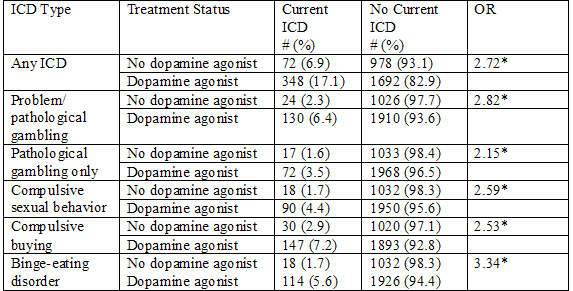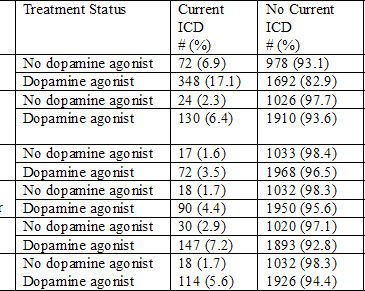Patients being treated for Parkinson disease (PD) have been reported to have a disproportionately high prevalence of disordered gambling and other impulse control disorders (ICDs) such as compulsive shopping, binge-eating, and hypersexuality (e.g., Bostwick, Hecksel, Stevens, Bower, & Ahlskog, 2009; Evans, Strafella, Weintraub, & Stacy, 2009). The development of these disorders appears to be most associated with dopamine agonists, a type of medication commonly used to treat PD, but estimates of the effect have varied. This week’s WAGER reviews a large cross-sectional study designed to obtain more accurate data about ICD prevalence among those with PD and the association of ICDs with dopamine agonists (Weintraub et al., 2010).
Methods
- The authors recruited participants (n=3,090) from patients receiving their regular care at 46 movement disorder centers in the United States and Canada.
- Individual sites developed their sampling plans (e.g., attempting to recruit every third patient scheduled during a clinic) before starting.
- Investigators included subjects in the study if they met the following criteria:
- Between the ages of 30 to 75 years;
- Had been taking medication for PD for >1 year and had responded to treatment;
- Had not started or stopped dopamine agonist therapy within the past 6 months.
- Patients were assessed for current ICDs using a semi-structured interview and formal diagnostic tools.
- The Massachusetts Gambling Screen (problem gambling, 3-4 criteria endorsed; pathological gambling, 5 or more criteria) (Shaffer, LaBrie, Scanlan, & Cummings, 1994) identified disordered gambling.
- Compulsive buying and sexual behavior were assessed by the Minnesota Impulsive Disorders Interview (Christenson, Faber, & deZwaan, 1994).
- Investigators determined the presence of binge-eating by using the proposed research criteria from the DSM-4 TR (Diagnostic and Statistical Manual of Mental Disorders, 2000).
- The researchers calculated odds ratios to compare ICD frequencies between PD patients on dopamine agonist therapy and those receiving other treatment; they used several statistical tests to assess the strength of the association (i.e., Cochran-Mantel-Haenszel; Breslow-Day; Wilcoxon-Mann-Whitney).
Results
- Compared to PD patients not taking a dopamine agonist, PD patients prescribed a medication in this class were 2.7 times more likely to be diagnosed with an ICD and 2.8 times more likely to be diagnosed with disordered gambling (see Table 1).
- Overall, 17.1% of patients taking dopamine agonists were diagnosed with one or more ICDs, compared with 6.9% of patients on alternative treatment. The highest relative risk for patients on dopamine agonists was for binge-eating disorder: 5.6% of patients taking dopamine agonists were diagnosed with binge-eating disorder, compared to only 1.7% of patients on alternative treatment.
- The four ICDs measured by this study occurred at similar frequencies among patients taking dopamine agonists, ranging from 4.4% for compulsive sexual behavior to 7.2% for compulsive buying.
- Many patients had more than one disorder: of the 348 subjects on dopamine agonists that were diagnosed with an ICD, the average number of ICDs was 1.38.
- On average, patients diagnosed with an ICD were younger, less likely to be married, more likely to smoke, and more likely to report a family history of alcohol abuse or gambling problems than patients not diagnosed with an ICD. There was no statistically significant association between ICD diagnosis and sex, race, or PD duration or severity.
Table 1: ICD Frequencies by Dopamine Agonist Treatment Status (adapted from Weintraub et al 2010)
*p < 0.005 for all OR
Limitations
- This study captured ICD prevalence at a particular moment. Because side effects from PD treatment can change over time, this study might underestimate the total number of patients that will eventually develop an ICD with treatment.
- The lack of an untreated PD group or a non-PD control group prevents direct comparison with overall ICD prevalence in PD or with the population as a whole.
- The authors did not assess mediators of impulsive behavior such as motivation, mood or other disorders that could be differentially influenced by dopamine agonist treatment.
Discussion
Weintraub et al (2010) examined the association between dopamine replacement therapy and ICDs in a large sample of patients being treated for PD. Consistent with previous studies, (Bostwick et al., 2009; Evans et al., 2009) patients treated with dopamine agonists were significantly more likely to be diagnosed with one or more ICDs than those on alternative treatments. Although dopamine agonists are associated with elevated risk for ICD, more research is necessary to determine the cause of this increase and which subgroups of patients are most at risk. Clinicians should discuss the risk of ICDs with patients and their families when starting dopamine replacement therapy for PD.
-Liz Joe
What do you think? Please use the comment link below to provide feedback on this article.
References
Bostwick, J. M., Hecksel, K. A., Stevens, S. R., Bower, J. H., & Ahlskog, J. E. (2009). Frequency of new-onset pathologic compulsive gambling or hypersexuality after drug treatment of idiopathic Parkinson disease. Mayo Clinic Proceedings, 84(4), 310-316.
Christenson, G. A., Faber, R. J., & deZwaan, M. (1994). Compulsive buying: descriptive characteristics and psychiatric comorbidity. Journal of Clinical Psychiatry, 55(1), 5-11.
Diagnostic and Statistical Manual of Mental Disorders. (2000). (Fourth Edition, Text Revision ed.). Washington, DC: American Psychiatric Association.
Evans, A. H., Strafella, A. P., Weintraub, D., & Stacy, M. (2009). Impulsive and compulsive behaviors in Parkinson’s disease. Movement Disorders, 24(11), 1561-1570.
Shaffer, H. J., LaBrie, R., Scanlan, K. M., & Cummings, T. N. (1994). Pathological gambling among adolescents: Massachusetts gambling screen (MAGS). Journal of Gambling Studies, 10(4), 339-362.
Weintraub, D., Koester, J., Potenza, M. N., Siderowf, A. D., Stacy, M., Voon, V., et al. (2010). Impulse control disorders in Parkinson disease: a cross-sectional study of 3090 patients. Archives of Neurology, 67(5), 589-595.





kathleen June 29, 2017
This is an informative article and i will try to go through it again and again.
Thank for share and do more research of these kind they may be helping someone somewhere